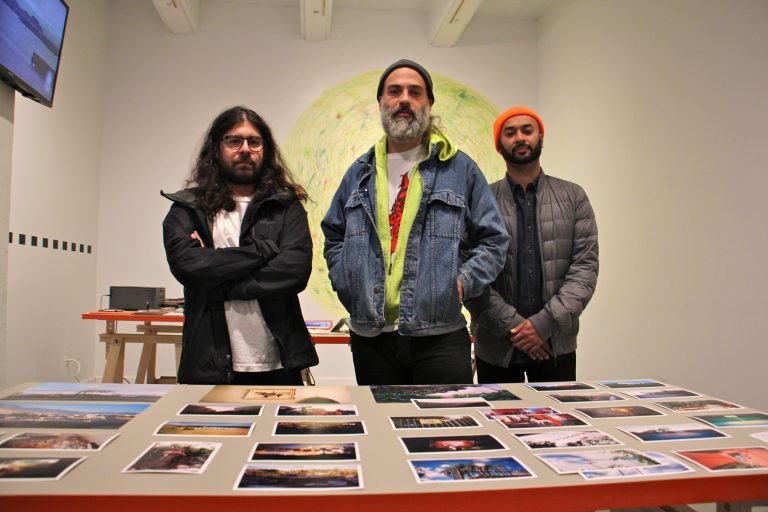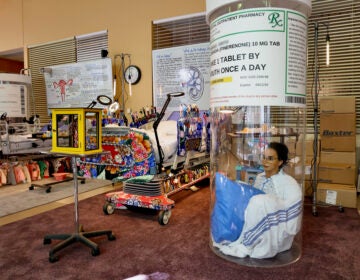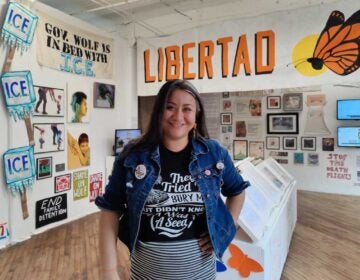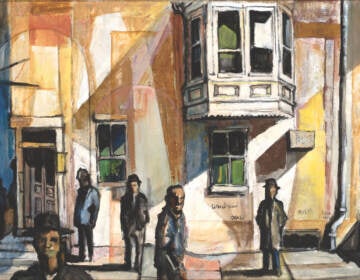In Puerto Rico, Philadelphia artists find activism in wake of hurricanes
The aftermath of Hurricane Maria may give rise to mobilized activism in Puerto Rico, finds a team of Philadelphia artists.
Listen 2:15
Artists (from left) Ricky Yanas, Grimaldi Baez and Sheldon Abba at their exhibit, "Extension or Communication: Puerto Rico" at the Crane Arts Building. (Emma Lee/WHYY)
In the aftermath of the multiple hurricanes that hit Puerto Rico last year, a group of Philadelphia artist rallied $14,000 in donations, used to send solar powered lights and water filters to the island.
“That’s what was asked for. Those were the things that were needed,” said Grimaldi Baez, who was born on the island and still visits frequently. “They don’t need food and lights anymore. The situation has changed. To understand those needs I had to go there.”
Baez and two other artists – Ricky Yanas and Sheldon Abba – spent a week and a half in Puerto Rico in December. After the initial rush to help people survive began to wane, they went in search of a rising political urgency.
Armed with cameras, recording equipment, sketchbooks, and mobile phones, the artists made a 10-day dash to gather whatever they could to collect images and make connections. The stuff they came back with is now on display as “Extension of Communication: Puerto Rico,” at the gallery of the artist collective Tiger Strikes Asteroid, in the Crane Arts Building of Kensington.
“We were going to connect with groups there that were thinking in a similar way – similar to our critical discourse,” said Yanas, a member of the Tiger Strikes Asteroid collective. “Me and Grimaldi talk about what it looks like to make spaces outside of institutional control, things that don’t reflect the ideals of capitalism, things that are inherently collaborative.”
They found a Puerto Rican artist collective that is planning to open a solar-powered video editing studio in the mountains, to make documentary films about Puerto Rico even if another hurricane wipes out power.
They discovered the owner of a farm-to-table restaurant, El Departamento de la Comida, whose culinary model was all but dismantled by the destruction of farmland by the hurricanes. Now, Tara Rodriguez Besosa has started the Puerto Rico Resilience Fund, to start 200 community gardens by 2019.
They stumbled onto a crew of guys who spent their days chopping up felled trees and distributing water to whomever needed it. Baez stayed glued to social media while in Puerto Rico, scanning for individuals taking their own initiative to help other people.
“There were people chopping trees with a GoPro camera on, a live feed of a crew chopping and delivering water,” said Baez, who blindly direct-messaged them with an offer of supplies. “If you can respond to this [message], that’s your qualifier. I will send you stuff. That’s how I identified folks.”
All the while, they were collecting the raw material of what might become artwork. Yanas took a long, sustained camera shot of a rainspout dripping onto a flowering cacao plant. It’s a beautiful image — almost meditative with the sound of falling water — but it also speaks to the islands’ issue of food sovereignty.
Cacao was once a major crop for Puerto Rico, where the climate is ideal for the plant, but it has not been commercially grown for hundreds of years. Some farmers are attempting a comeback after Hurricane Maria and other storms .
Another lasting image, in Baez’s mind, is the defoliated forests of the island, which lost their leaf canopies in the hurricanes. It exposed the poverty that had been living in the mountains.
“The architecture of colonialism is laid bare,” he said. “There are people today who live in the mountains, identified by their blue FEMA tarps on their roofs. They are living the same says they did 100 years ago. That’s abject poverty. That is a slow death. It’s not a quaint, folkloric rendering of the noble peasant. It’s misery.”
During the run of “Extension or Communication,” the artists will be in the gallery poring over the material they came back with, trying to make sense of everything they witnessed just a few weeks ago. They are treating the space as a workshop: other artists are invited to add their work to the show, public discussions will be planned, and the artists will bolster relationships they forged while on the island.
“There is a value in the resiliencies you see in communities that are befallen by things like storms or lack of services. You see that in Philadelphia,” said Abbas. “It’s important for me to see how people are organizing down there. To see how it can be applicable to other communities that find themselves without government resources in their times of need.”
WHYY is your source for fact-based, in-depth journalism and information. As a nonprofit organization, we rely on financial support from readers like you. Please give today.





